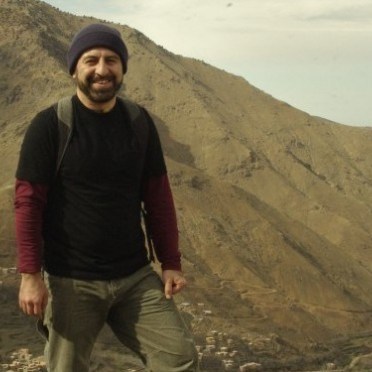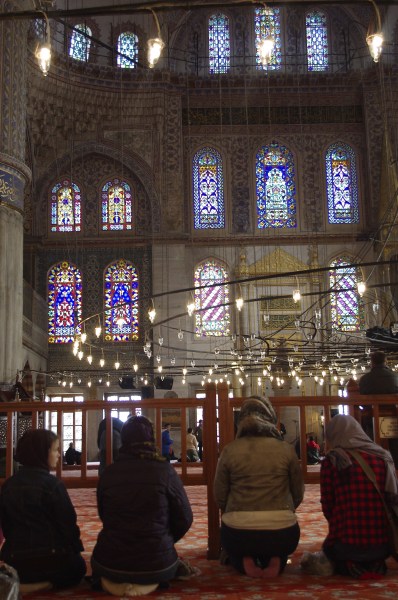How the XMNR is Preparing Me to be a Global Leader
February 9, 2015

By: Hugo Mogollon
On January 7th, two Muslim extremists attacked Charlie Hebdo, a satiric newspaper in Paris, carrying out an act that shocked the world and raised grave fears of more terrorist attacks. While a tense situation was developing in Europe with an increase of sentiments against Islam, I was, in contrast, experiencing the tremendous amount of beauty that the Islamic culture had to offer. I was visiting two Muslim countries – Morocco and Turkey – as part of my international residency (IR) with the Executive Masters of Natural Resources (XMNR). All the colors, textures, flavors, sounds and sights of these countries overwhelmed my senses. And the kindness and generosity of the people that offered to us their time, food, and other resources made me feel welcomed and safe.

In my role as a student, I asked myself what I could takeaway from this opportunity to understand the dichotomy that is often present in many situations in the world. Moreover, what does it mean in the context of global leadership and sustainability? I want to be a leader who is empathetic and open to understanding a religion that shapes the values of 23% of the people in the world, and I wondered how I could apply the leadership skills I learned in my classes this past year to that end. How do I avoid making assumptions, and how do I develop respectful and effective relationships across cultural boundaries? How can I remain open and curious to the local ways and carry out my professional work in that context?
Twelve years ago, fourteen young men also launched a similar terrorist attack in Morocco’s biggest city, Casablanca. All of these men came from an economically depressed neighborhood, just like the attackers of Charlie Hebdo in Paris. Coincidentally, we visited this neighborhood in Casablanca, called Sidi Moumen,where currently, the Moroccan government, NGOs and foundations are pouring efforts and resources into improving the people’s living conditions and preventing the youth from falling into the hands of extremism.
We saw first-hand the pressures and problems that fast-growing cities in developing countries face. In a world that is trending toward urbanization, with 66 percent of the world’s population projected to live in cities by 2050 (PDF), resource scarcity and climate change will make it harder for cities to provide public health, safety, and ecosystem services to all of these newcomers. A healthy society is a sustainability issue. The key here is managing the natural resources through strong collaborative processes to avoid social problems that could later radicalize individuals, leading to violence.

The trip was full of examples like this, where we had the opportunity to learn how important it is to be creative and to find solutions that are inclusive and involve internal and external stakeholders. For example, we visited the solid waste management company in Casablanca, which engaged rag pickers who were living in the landfills and informally collecting recyclables. The company helped them move into affordable housing and organize them into a co-operative to sell the recycled materials, and share the profits among the members.
The company formally integrated the recycling process to its value chain, setting up inside their plant a simple materials recovery facility that is operated by the Co-op. This investment helped the company save money and increase their profit by reducing the amount of waste that they need to process by sixty percent. At the same time, the life of the landfill has also been extended, since less materials go to waste, securing their operations in the area for longer and reducing uncertainty for the company. In this way, the company secured significant economic and environmental benefits for themselves, and they provided a safer, productive, and sustainable future for this community of individuals who had been living at the furthest edges of society.
While we witnessed a best-case example, we also had the chance to see what happened when leaders are not empathetic, don’t understand the needs of others, and are not open to dialogue. In Istanbul, the government made a unilateral decision to develop one of the city’s last remaining parks, generating significant civic unrest. The situation deteriorated even further when a nonprofit organization attempted to protect the park by suing the government, and the government retaliated by accusing the group of terrorism. This is the epitome of a lost opportunity. Had the government attempted to engage the stakeholders, perhaps it could have resulted in a creative, pioneering, mixed-use eco-park that could have preserved much or most of the park while allowing for some development.

Viewed through a sustainability lens, the world’s communities don’t seem all that different from each other. In Morocco and Turkey we found amazing, talented, and generous local leaders ready to find acceptable compromises in order to promote progress, wealth, and human wellbeing in their societies. This type of approach can certainly go a very long way in avoiding incidents like the Charlie Hebdo’s attack from happening in the future. In my opinion, in the post 9/11 world, new threats do not stem so much from religious extremism, but rather from climate change, resource scarcity, and a lack of governance — a dangerous combination!
I have now seen first-hand how leadership is a mix of fundamental skills that wield extraordinary power when used to shape strong multi-sector, cross-cultural collaborations, and in turn create effective governance for our world. I see myself as a leader who has the opportunity to become part of that change. As a student of the XMNR program, I feel fortunate to have been prepared to face the challenge.


